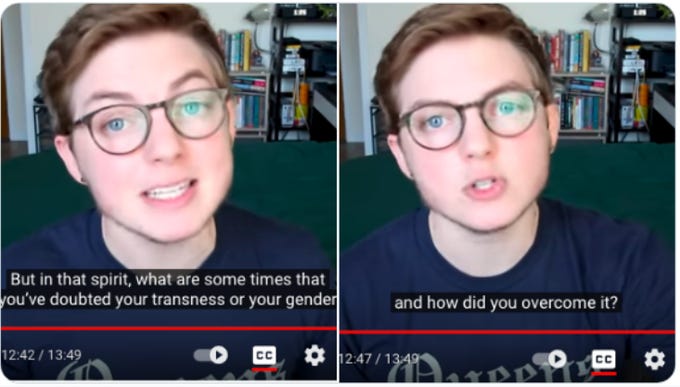Internalized transphobia, part 2
“The group says in essence, ‘We love you because you are transforming yourself,’ which means that any moment you are not transforming yourself, you are slipping back.” - Margaret Singer Thaler
Resistance, doubts, scruples (‘internalized transphobia’) are part of the story arc that leads to accepting your trans identity and embarking on transition. It’s too hard, you couldn’t possibly, and then you simply must.
Trans-identified adults shape this lore, even many of those who nominally discourage transition as too hard, not for kids, not something you should ever do — unless you have no other choice. For dysphoric youth seeking a solution as grand as the developmental challenges they face, such discouragements only add to the mystique and promise of transition.
Besides, the context in which youth discover trans identity tends to leave no choice: If you’re questioning, you’re trans. If you’re trans, it’s transition or else.
(Or, as cult leader Marshall Applewhite of Heaven’s Gate put it: “You already know or you wouldn’t be asking.”)
At every step, trans ideology undercuts community members' confidence in their own judgment. Doubts are normal and actually a sign of being trans, so there's nothing to see here, no reason to slow down or seriously investigate.
Trans ideology installs an unsleeping internal watchman. When questions & doubts surface, this watchman says: If you could be not just wrong but totally in the dark about something so basic and all-encompassing as Being Trans, just how reliable is your judgment?
The trans community inculcates fragility and laces social life with landmines—like elaborate pronoun protocols and unreasonable expectations—creating reentry problems when members venture out into the real world. You're encouraged to distance yourself from anyone who isn't 100% onboard with your new identity, so you turn against loving family and friends. This only makes you doubt yourself more: you worry you don't know how to evaluate people, that you're a poor judge of character. Confronted with rejection and misunderstanding in the outside world, members become ever more dependent on the trans community, the only people capable of “understanding” you.
And if something doesn't feel right, who are you to judge? Isn't that just your internalized transphobia talking? Aren't you hurting not just yourself but other trans people when you ask the wrong questions and say the wrong things?
It's hard to overstate how manipulative trans communities are and what a treadmill to ever more extreme beliefs, attitudes, intentions, and actions young people step on to when they're pushed to question their gender online.





Another amazing insight piece. Thank you. Teens are especially vulnerable to this kind of direction — always looking for an easy answer, always looking to fit in, always looking for confirmation of who they are. They trust outside sources for affirmation to counteract their internal destabilized existence. Surely the vast majority of pediatric psychologists understand this. Where are their voices?
"The trans community inculcates fragility and laces social life with landmines—like elaborate pronoun protocols and unreasonable expectations—creating reentry problems when members venture out into the real world."
This is so important. How should we respond to a belief system that decreases our resiliency and our belief in our resilience? Do we pause to think about how we're being impacted? Are we encouraged to question deeply within ourselves? Is there room for us to disagree or change our minds? If not, what are we signing on to and why?